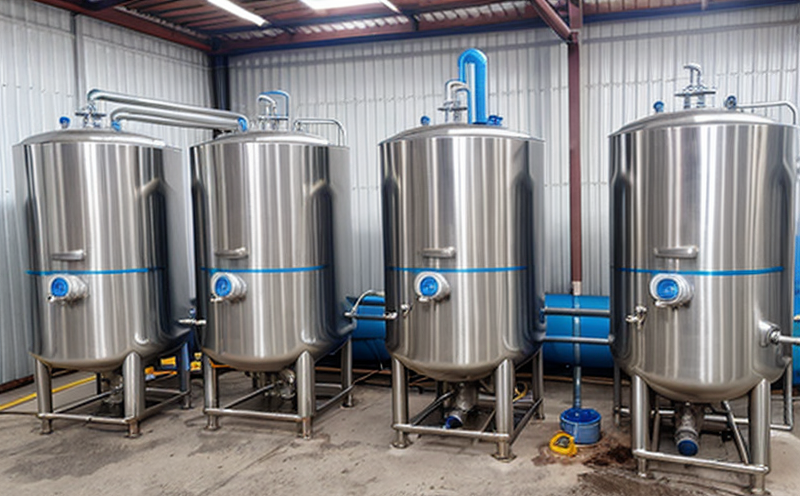ASTM D1886 Oil and Grease Test in Boiler Water
The ASTM D1886 test method is a widely recognized standard used to determine the concentration of oil and grease in water samples. This particular service focuses on applying this method specifically to boiler water, which is crucial for maintaining efficient and safe operation of industrial boilers.
Boiler systems are essential components in many industrial processes, including power generation, manufacturing, and heating facilities. The presence of oil and grease in boiler water can lead to significant operational challenges. For instance, it may cause scaling on heat exchangers, leading to reduced thermal efficiency and increased energy costs. Additionally, excessive levels of oil and grease can result in fouling of the boiler tubes, which might require costly cleaning or replacement.
The ASTM D1886 method involves a series of steps designed to accurately measure the total amount of oil and grease present in the water sample. This includes the use of an extraction solvent, typically xylene, followed by gravimetric analysis using a Soxhlet apparatus. The procedure is stringent and ensures reliable results that are critical for making informed decisions regarding maintenance schedules and operational parameters.
By adhering to this standard method, laboratories can provide accurate measurements that help operators understand the condition of their boiler systems. This knowledge is vital for preventing potential issues before they become costly problems. Regular monitoring allows for proactive management of oil and grease levels, ensuring optimal performance and longevity of the equipment.
The precision and accuracy offered by ASTM D1886 make it an indispensable tool in quality control programs aimed at maintaining high standards across various industrial sectors. Whether you are involved in manufacturing, energy production, or any other field utilizing boiler systems, understanding the current state of your water is essential for sustainable operations.
For those responsible for ensuring compliance with environmental regulations, such as the Clean Water Act (CWA), accurate testing results play a crucial role in demonstrating adherence to legal requirements. By using ASTM D1886, laboratories can provide data that supports these efforts effectively.
Why It Matters
Boiler systems are integral parts of many industrial processes, from power generation to manufacturing plants. The quality of the water used in these systems directly impacts their efficiency and longevity. Contaminants like oil and grease not only reduce thermal performance but also accelerate corrosion rates within the boiler components.
- Thermal Efficiency: Excess oil and grease can form deposits on heat exchanger surfaces, reducing heat transfer efficiency. This leads to higher fuel consumption and increased operational costs.
- Corrosion Prevention: Corrosive environments created by certain types of oil and grease can accelerate metal degradation within the boiler system. Routine monitoring helps identify such conditions early, allowing for timely interventions.
- Fouling Control: Fouling occurs when impurities accumulate on surfaces inside the boiler tubes, leading to reduced heat transfer capabilities. Effective control measures are necessary to maintain optimal operating conditions.
Incorporating ASTM D1886 into your routine maintenance practices ensures that you have reliable data about the quality of your boiler water. This knowledge enables you to take corrective actions promptly when needed, thereby extending the service life of your equipment and minimizing disruptions in production schedules.
Benefits
- Precision Measurement: ASTM D1886 provides a standardized approach for quantifying oil and grease content, ensuring consistent results across different samples.
- Compliance Assurance: Meeting regulatory standards like the Clean Water Act (CWA) is easier with accurate testing methods that provide verifiable data.
- Proactive Maintenance: Regular monitoring helps identify potential issues before they escalate into major problems, reducing repair costs and downtime.
- Sustained Performance: By maintaining optimal levels of oil and grease in boiler water, you ensure peak performance throughout the operating cycle.
The benefits extend beyond mere compliance; they contribute significantly to operational efficiency and environmental sustainability. Effective management of contaminants supports long-term viability while minimizing adverse impacts on both infrastructure and natural resources.
Customer Impact and Satisfaction
Implementing ASTM D1886 in your boiler water management strategy has numerous positive impacts on customer satisfaction and operational performance:
- Enhanced Efficiency: By ensuring optimal oil and grease levels, you reduce energy consumption and improve overall plant efficiency.
- Safety Assurance: Regular monitoring helps prevent accidents caused by poor water quality leading to safer working environments.
- Economic Benefits: Minimized maintenance costs and extended equipment lifespan contribute directly to financial savings for your organization.
- Environmental Responsibility: Adhering to best practices in boiler water treatment aligns with broader sustainability goals, enhancing public perception of your company.
Our commitment to providing accurate ASTM D1886 tests ensures that you receive reliable information necessary for effective decision-making. We pride ourselves on delivering services that go beyond mere compliance, offering valuable insights into the health of your boiler systems and contributing towards sustainable practices.





